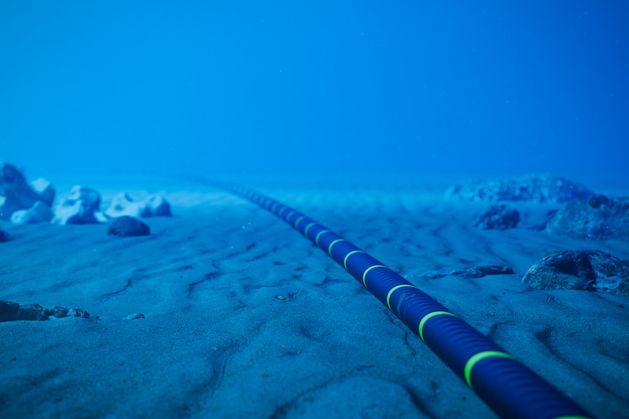I wonder will we look back at stuff like this as the very beginnings of recursive self-improvement by artificial intelligence.
When size and weight don't matter, lots of other battery chemistries can work.

Could be, but isn’t, which is where some regulations probably need to come in.
I assume also that the technological side of things is far from perfected, but that will improve over time.
There's no reason it couldn't be a closed system, where any fertilizer that doesn't become part of the crop biomass is recycled.
Flow Computing has developed a new computing architecture that combines parallel processing units with CPUs. By reducing the overhead of parallelization, the company claims it can effectively make a CPU 100 times faster.

Major steps towards better, sustainable and affordable food production free of environmental challenges have been taken, with the "world's first farm to grow indoor, vertically farmed berries at scale" opening in Richmond, VA. It's backed by an international team of scientists that see this new…

Active euthanasia is legal in a few countries for terminally ill patients.
That doesn't seem an accurate description of the situation. Yes, doctors and nurses sometimes 'help people along' in their final hours or even days, that is not the same thing as the euthanasia being described here.
As sad as this topic is, this is a much better way to go than a prolonged miserable painful death where you suffer the last months of a terminal disease.
UK actuaries report that climate change forecasts of economic impact are “implausible” and “dangerously…benign”

I wonder with all the billions investors are pouring into OpenAI, did they even hire one single competent lawyer? Maybe they sacked them when they got rid of all the ethics people.
No shit
It's obvious to some of us, but not to many. Hence why it's so important to keep saying it. Particularly at a UN summit about the future.
It's bizarre that in 2024 the UN permanent security council has two European countries (three if you count Russia as Europe) and zero representation from Africa, India or South America. It seems like a strange relic from the past where France and the British Empire were still world powers.
People often criticize the UN for being a toothless talking shop. While that criticism has plenty of merit, it still has some effectiveness.
In particular, this shows a commitment to the direction of travel of global society in the 21st century. It recognizes the danger of AI and warfare and of warfare spreading to outer space.
I was surprised by how much of it was about rejecting current models of financing and International Development. Again, there is only a weak commitment to concrete action right now, but it indicates where majority thinking is heading.
United Nations adopts ground-breaking Pact for the Future to transform global governance New York, 22 September 2024 – World leaders today adopted a Pact for the Future that includes a Global Digital Compact and a Declaration on Future Generations. This Pact is the culmination of an inclusive, years...

With the issue of hallucinations. There is no sign of a solution to this problem and it renders much of the potential applications useless. It doesn't matter in art generation, but I would never want to trust it with a life or death decision, or even one that was slightly important.
*So, what exactly is this device? That remains one of the biggest questions. According to The Times, Ive and Altman have discussed how generative AI could revolutionize the way people interact with computers. Their vision is to create a device that can handle complex tasks far beyond the capabilities of traditional software. It’s rumored that last year’s discussions were inspired by touchscreen technology, potentially taking cues from the original iPhone.
I am simultaneously intrigued and mystified. I'm trying to figure out how a combination of a touchscreen and generated AI could be a revolutionary new advanced way to interact with software. I guess we will have to wait and see.
I think renewable energy's decentralized nature is one of its most underappreciated features. You could never imagine a local community building a conventional electricity plant, they are centralized and that is the job of government.
I suspect the future will have much more local decentralized projects of this nature. When you can have robots running factories without the need for humans, why not self-finance and build these at the community level too? It's entirely feasible, and many people will want to do such things. It's initiatives like this that make me doubt the future will be dystopian.
All revenues generated go back into the community.

Rough calculations suggest that, on current trends, adding 12 hours of storage to the entire US grid would cost around $500 billion and pay for itself within a few years. By contrast, upgrading the US transmission grid could cost $7 trillion over 20 years.
Counterintuitively, electricity cables under the North Atlantic might be much more economical. It would not have the eminent domain and construction complexities of upgrading the US continental land grid. If this cost estimate is accurate, it may be much cheaper.
Is it really much more secure though? Wouldn't one well-placed underwater bomb knock it out of action for weeks or months?
If security was your top priority, surely decentralized microgrids with widely dispersed battery grid storage would be much more effective?
Ireland is at the centre of plans for a powerful new trans-Atlantic electricity link aimed at protecting Nato members’ energy security, the Irish Independent has learned.

Chinese companies often get accused of copying Western technology, so it's unusual to hear the CEO of such a major Western company bucking that assumption by calling on Western companies to copy China.
What Jim Farley is saying about cars is equally true about 21st century energy infrastructure. There is no doubt that China is the global leader in innovation there too.
Meanwhile in many Western countries, debate still centers around persuading some people that the energy transition to renewables is real and the age of fossil fuels can't end quickly enough. Hostility to renewables, EVs and the energy transition gives China the edge.
Next up we can expect China to race ahead in robotics.
If you are an optimist or even a glass-half-full kind of person, sometimes it can be hard to miss the good news among all the doom and gloom that social media promotes. The story of our energy transition to renewables is surely good news. Chiefly because it will help us alleviate climate change, but there is another under-reported and under-appreciated aspect of the energy transition.
As energy production becomes decentralized and in the hands of individuals and small communities it smashes the power of centralized top-heavy states, authoritarians, and autocrats.
Some people have nightmare visions of the future where humans are reduced to powerless serfs. However if you can live in a world where you can generate your own energy off-grid, and AI can provide for many of your other needs, perhaps with robotics helping with local and personal food production - then who the hell is going to want to be a serf-slave in some horrible Hollywood sci-fi dystopia that we know from movies?
Yes, it's an odd statement. The authors are all Harvard scientists, and I have checked what they post on Twitter, they aren't anti vaccine cranks. Though one of them, Al Ozonoff, does try to engage with such people. Perhaps this is a concession in a similar vein of outreach. The Hill is a conservative news website. Perhaps they felt they had to get their own dubious science a mention, and that was the price of publication for the Harvard scientists?
I agree, to me one of the most frustrating aspects of much online discussion of AI is that it focuses on trivial chatter and nonsense. In particular boring fanboyism when it comes to the likes of Musk or OpenAI. Meanwhile the truly Earth shattering long-term events are happening elsewhere, and this is one example of them. Halving unexpected deaths in hospital settings is such a huge thing and yet it goes barely reported, in comparison to the brain-dead ra-ra Silicon Valley gossip that passes for most discussion about AI.
Can artificial intelligence (AI) help reduce deaths in hospital? An AI-based system was able to reduce risk of unexpected deaths by identifying hospitalized patients at high risk of deteriorating health, found new research published in Canadian Medical Association Journal.

I admit I don't know very much about any of this, but I've never heard of children who grow up in relatively isolated circumstances, for example home schooling, having lower functioning immune systems?
Here at UT, we’ve had several stories that describe the concept of a space elevator. They are designed to make it easier to get objects off Earth and into space. That, so far, has proven technically or economically infeasible, as no material is strong enough to support the structure passively, and i...

Tulos haastaa pitkään vallalla olleen käsityksen siitä, että päiväkotien taudit leviäisivät lähinnä pisaroiden ja kosketuksen välityksellä.

Two new AI systems, ALOHA Unleashed and DemoStart, help robots learn to perform complex tasks that require dexterous movement
At this point, I'm pretty sure Chinese taikonauts will get to the Moon, before American astronauts return.
I don't have sources for the 2024 deflation in China and AI. (I qualified my initial statement "hard to know").
Robotics are a proxy for AI in manufacturing.
I suspect AI is about to give us a type of deflation no economist has ever seen or modeled before. What will happen when AI gives us the expert knowledge of doctors, lawyers, technicians, teachers, engineers, etc etc almost for free?
You can't talk of this scenario in terms of past models, because it's never happened before, but we can clearly see that it's just about to happen to us right ahead.
The last 12 months have seen the most sustained period of deflation in China since the late 1990s. It's hard to know how much AI is responsible, but I would guess it is to some extent. It's driving the reduction in prices in the manufacturing of so many things, EVs especially.
Many people assume unemployment will be AI's most destructive economic effect. That may be true, but before it causes a problem, there will be a far more immediate one to deal with - deflation.
Deflation is so destructive because it shrinks businesses' incomes while increasing the size of their debt relative to this income. If there is sustained deflation, then this leads to a spiraling collapse that takes asset prices like the stock market and property values with it. This was the main mechanism that caused most of the damage in the Great Depression.
If AI is on the cusp of giving us lawyers, doctors, and other experts knowledge for practically free, then it follows that there is massive deflation to come. There is already a backlash against AI in some quarters, I would expect it to grow when the deflation problem arrives.
China's policymakers need to focus on boosting domestic demand, Yi Gang, former head of the People's Bank of China, said Friday at the Bund Summit in Shanghai.



